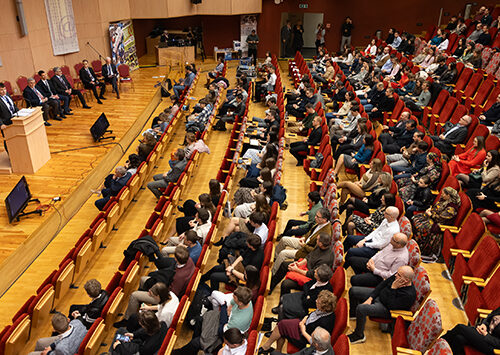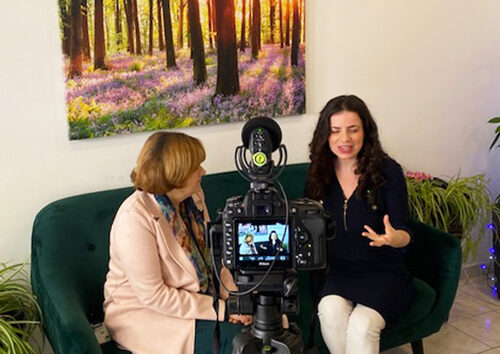12 April 2016 | Binfield, UK [tedNEWS/Kirsty Watkins/Helen Pearson] Participants at two separate events on the Newbold College campus recently learnt the basics of dealing with conflict as a Christian, and how to respond to issues related to money, debt and credit.
 On Sunday, 10 April the College’s Centre for Christian leadership hosted an Introduction to Dispute Resolution. With a specific focus on church environments, Cathy Boldeau, founder and lead trainer at VisionSolutions taught attendees how to understand conflict better, how it can be resolved, and how it can form the basis of transformation.
On Sunday, 10 April the College’s Centre for Christian leadership hosted an Introduction to Dispute Resolution. With a specific focus on church environments, Cathy Boldeau, founder and lead trainer at VisionSolutions taught attendees how to understand conflict better, how it can be resolved, and how it can form the basis of transformation.

During the workshop participants learnt how to identify in themselves what events or attitudes within conflicts are likely to trigger an escalation – such as the inference of blame, the tendency to be biased, make assumptions, or to demonstrate prejudice or to discriminate — either positively or negatively. She also covered the basics ‘commandments’ of effective dispute management, including active listening, following fair processes that preserve common interests, and seeking future-focused solutions that ensure mutual gain.
 “Effective conflict management is increasingly important in this day and age,” Boldeau said, noting the ‘obsession’ that 21st century society has with litigation, and the escalating frequency with which it has appeared both in the media and in the church over the past few decades. “Both, cultural diversity and theological diversity increase the likelihood of conflicts within the Church,” she said. The Centre for Christian leadership sees this as important for the Church, helping both the institutions and the membership to understand how to manage conflict and to move forward in a positive way.”
“Effective conflict management is increasingly important in this day and age,” Boldeau said, noting the ‘obsession’ that 21st century society has with litigation, and the escalating frequency with which it has appeared both in the media and in the church over the past few decades. “Both, cultural diversity and theological diversity increase the likelihood of conflicts within the Church,” she said. The Centre for Christian leadership sees this as important for the Church, helping both the institutions and the membership to understand how to manage conflict and to move forward in a positive way.”
“I learnt some valuable lessons about self-awareness, and (when dealing with conflict) situations, to evaluate what may trigger conflict within myself and find a way to manage it,” said Judith, who attended the training because she deals with a variety of people of different ages and backgrounds in her line of work. “It was great to learn how to identify these triggers, and ways to manage how I respond to resolve conflicts successfully.”
 Two nights later, the final Diversity lecture for this academic year focused on an area that often creates conflict: money. How does it work in the commercial world and how might it work in the Christian life and community?
Two nights later, the final Diversity lecture for this academic year focused on an area that often creates conflict: money. How does it work in the commercial world and how might it work in the Christian life and community?
Andy Walton, the Communications Officer from the Centre for Theology and Community, began with an account of the questions asked by Christians in response to the Occupy movement. What should be the Christian response to a global financial system built on credit and debt when alcoholism, drug-taking and domestic violence are just some of the knock-on effects in individual lives? For the rest of the presentation, Andy showed four video clips from half-a-dozen Bible scholars and economists who asked thought-provoking questions and gave some answers. In between the clips, he offered opportunities for response and discussion by the audience in Newbold’s Smith Centre.

The story of Zacchaeus suggests that Jesus recognised that the tax collector as a man shrunk through involvement in the politically exploitative Roman empire’s revenue system. The mark of Zacchaeus’ repentance was paying back and seen as, ‘Money doing relational work’.
Then followed some church history on the Christian response to Exodus 22:25 with its prohibition of usury – or making a profit through lending money. Although various church leaders took different stances, and some allowed lending under specific circumstances, there has always been clear agreement that exploitative lending to the poor has always been anathema.
The presentation went on to talk about our individual financial responsibilities? How will I honour God with my wealth, power and influence – in my giving, in my tithing, in my market place behaviour, in my whole human experience? How will I develop a theology of personal finance? The ongoing challenge for Christians is to recognise that you can’t serve God and Mammon. As we look at our bank statements, do we ask prayerfully, “How have I built the kingdom with this transaction?”
How about a theology of money? If all things are reconciled and created in Christ, how do we bear witness practically to a common life in Christ, how do we embody it in flesh and blood? The theologians’ answers were various: by beginning with gratitude, by not allowing money issues to drive us into private spaces, by mutual accountability, by relational proximity, by speaking truth in public places, and by not allowing money to shape our reality.
 The attentive audience were reminded that money is never the church’s final solution. We must not see all our debt advisories and food banks and credit unions as ends in themselves. The vision is to see these valuable forms of pastoral care as places where people can touch, see, taste and smell what liberation feels like. The vision is to make them places where the good news speaks to our bodies, our relationships, and our whole lives. The good news is the welcome into the body of Christ and the church community as part of the kingdom of God.
The attentive audience were reminded that money is never the church’s final solution. We must not see all our debt advisories and food banks and credit unions as ends in themselves. The vision is to see these valuable forms of pastoral care as places where people can touch, see, taste and smell what liberation feels like. The vision is to make them places where the good news speaks to our bodies, our relationships, and our whole lives. The good news is the welcome into the body of Christ and the church community as part of the kingdom of God.
The scholars who featured in the videos and whose ideas are summarised in this report are:
1. Dr Luke Bretherton, Professor of Theological Ethics and Senior Fellow of the Kenan Institute for Ethics at Duke University, previously Reader in Theology & Politics and Convener of the Faith & Public Policy Forum at King’s College London.
2. Dr Krish Kandiah President, London School of Theology
3. Dr Eve Poole, Lecturer and writer in leadership, ethics, spirituality, capitalism and theology. Author of Capitalism’s Toxic Assumptions
4. Dr Esther D. Reed, Associate Professor of Theology and Religion, University of Exeter
5. Dr Anna Rowlands, Lecturer in Catholic Studies in the Department of Theology and Religion
6. Dr. Graeme Smith, Reader in Public Theology and Head of the Department of Theology and Religious Studies, University of Chester
7. The Most. Revd. and Rt. Hon. Justin Welby, Archbishop of Canterbury and founder of the Centre for Theology and Communit
The Diversity lectures will return in September. Newbold’s Centre for Christian Leadership is currently accepting expressions of interest in further workshops. For more information, contact [email protected] [tedNEWS]
tedNEWS Staff: Victor Hulbert, director; Esti Pujic, editor
119 St Peter’s Street, St Albans, Herts, AL1 3EY, England
E-mail: [email protected]
Website: www.ted-adventist.org
tedNEWS is an information bulletin issued by the communication department of the Seventh-day Adventist Church in the Trans-European Division.
You are free to re-print any portion of the bulletin without need for special permission. However, we kindly request that you identify tedNEWS whenever you publish these materials.



